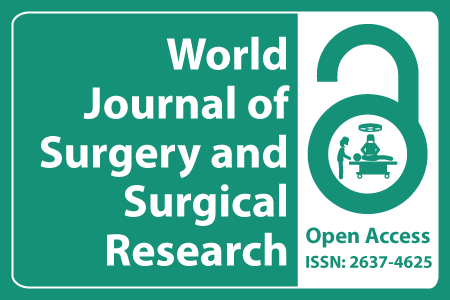
Journal Basic Info
- Impact Factor: 1.989**
- H-Index: 6
- ISSN: 2637-4625
- DOI: 10.25107/2637-4625
Major Scope
- Gastroenterological Surgery
- Dental Surgery
- Surgery & Surgical Research
- Aesthetic & Cosmetic Surgery
- Urological Surgery
- Surgical Oncology
- Bariatric Surgery
- Ophthalmology
Abstract
Citation: World J Surg Surg Res. 2023;6(1):1460.DOI: 10.25107/2637-4625.1460
Multimodal Prehabilitation during Neoadjuvant Chemotherapy in Patients with Colorectal Liver Metastases: Protocol for a Randomized Controlled Trial
Estalella L, Espina B , Minguez P, Renzulli M , Guasch A, Sirgo A, Moliné A, Pavel M, Llácer E, Memba R, Pueyo E, Ramírez E, Ferreres E, Carrillo L, Riesco D, Francesch A, Merino S, Geoghegan J and Jorba R
Department of General and Digestive Surgery, Hepatopancreatobiliary (HPB) Unit, University Hospital of Tarragona Joan XXIII, Spain Department of General and Digestive Surgery, Colorectal Surgery Unit, University Hospital of Tarragona Joan XXIII, Spain Department of Physical Medicine and Rehabilitation (PM&R), University Hospital of Tarragona Joan XXIII, Spain Department of Endocrinology and Nutrition, University Hospital of Tarragona Joan XXIII, Spain Psycho-oncology Unit, Oncology Institute of South Catalonia, University Hospital Sant Joan de Reus, Spain University Hospital of Tarragona Joan XXIII, Spain Department of Anesthesiology, University Hospital of Tarragona Joan XXIII, Spain Department of Internal Medicine, University Hospital of Tarragona Joan XXIII, Spain Department of Geriatrics, University Hospital of Tarragona Joan XXIII, Spain Department of Medical Oncology, University Hospital of Tarragona Joan XXIII, Spain Department of Hepatopancreatobiliary (HPB) and Liver Transplant Surgery, St. Vincent’s University Hospital, Ireland
*Correspondance to: Laia Estalella Mercadé
PDF Full Text Research Article | Open Access
Abstract:
Background: The current management for patients with Colorectal Liver Metastases (CRLM) requires a multidisciplinary approach. Most of them undergo Chemotherapy (CT) before liver surgery. However, CT objectively decreases functional capacity. It has already been demonstrated that a structured training program carried out during the 4 weeks following CT, while the patient is waiting for liver resection, is able to return functional capacity to baseline levels. Despite this, Multimodal Prehabilitation Programs (MPP) during preoperative CT have not been evaluated or implemented. The aim of this study is to investigate whether a 16-week MPP applied during and following CT in CRLM patients will result in a significant increase in physical fitness when compared to those that undergo MPP only during the 4-weeks, between the end of CT and liver resection. Methods: Prospective Randomized Controlled Trial (RCT). Eighty-four patients with CRLM who will undergo preoperative CT and surgery will be randomized to 16 weeks or to 4 weeks of a prehabilitation program. Interventions: in-hospital high-moderate intensive exercise training, high-protein supplementation, smoking cessation, psychological support and comorbidity and frailty assessment. The primary outcome will be functional capacity, assessed using the six-minute walk test. Secondary outcomes will include postoperative complications, length of hospital stay, readmission rates, quality of life and feasibility of the program. Discussion: This is the first RCT implementing a MPP for CRLM patients during preoperative CT. This may allow us to determine the optimum period for prehabilitation, in order to achieve the best improvement in patient physical fitness before liver surgery.
Keywords:
Prehabilitation; Physical fitness; Colorectal liver metastases; Neoadjuvant therapy; Liver resection
Cite the Article:
Estalella L, Espina B, Minguez P, Renzulli M, Guasch A, Sirgo A, et al. Multimodal Prehabilitation during Neoadjuvant Chemotherapy in Patients with Colorectal Liver Metastases: Protocol for a Randomized Controlled Trial. World J Surg Surgical Res. 2023; 6: 1460..













